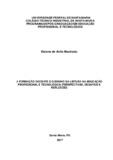| dc.creator | Machado, Daiana de Avila | |
| dc.date.accessioned | 2018-07-20T12:47:27Z | |
| dc.date.available | 2018-07-20T12:47:27Z | |
| dc.date.issued | 2017 | |
| dc.identifier.uri | http://repositorio.ufsm.br/handle/1/13864 | |
| dc.description.abstract | Due to the difficulties students have in understanding what they read and understand the construction of the meanings of several texts, this work seeks to investigate the extent to which initial and continuing training assists teachers of Portuguese Language in the development of reading teaching in the context of Professional and Technological Education. I used as main references to support this work, the theoretical contributions of: Frigotto (2012), Gramsci (2000), Manfredi (2002), Moll et al. (2010), Ramos (2010), among others, (for Professional and Technological Education); Freire (1992 and 2014), Gauthier (1998), Moura (2008), Machado (2008), Nóvoa (1992, 2000, 2009), Pimenta (2008), Rodrigues (2006), Tardif (2014), among others, (for Teacher Training); Kleiman (1989, 2007, 2013), Koch (2014), Koch and Elias (2015), Koch and Travaglia (2011), Solé (1998), among others, (for Reading in Portuguese Language Teaching). This research was developed with the Portuguese Language teachers of the Federal Institute Farroupilha - Campus Julio de Castilhos. The methodology used focused on the discursive analysis theory of Moraes (2003) and Bakhtin (1981; 1992; 2006), with a focus on the description and interpretation of discourses, therefore, of a qualitative nature, capable of exposing objectivity and subjectivity, besides allowing the interpretation and, mainly, the production of data from social relations. I have selected for the analysis three program of studies, one from each level of education, and kept in touch with four teachers working Portuguese Language on the Campus to conduct the interviews. I understand that the development of this work with the results obtained will enable the Portuguese Language teacher to reflect and self-evaluate his pedagogical actions, as well as to conquer spaces for the realization of continuous training, so that he can be assisted in the execution of his activities, so that the teaching of reading allows the student to better understand the world in which he is inserted, as well as appropriating linguistic resources, making him a more critical, conscious and active citizen in society. | eng |
| dc.language | por | por |
| dc.publisher | Universidade Federal de Santa Maria | por |
| dc.rights | Attribution-NonCommercial-NoDerivatives 4.0 International | * |
| dc.rights.uri | http://creativecommons.org/licenses/by-nc-nd/4.0/ | * |
| dc.subject | Educação profissional e tecnológica | por |
| dc.subject | Formação docente | por |
| dc.subject | Ensino | por |
| dc.subject | Leitura | por |
| dc.title | A formação docente e o ensino da leitura na educação profissional e tecnológica: perspectivas, desafios e reflexões | por |
| dc.title.alternative | The teacher training and teaching of reading in professional and technological education: perspectives, challenges and reflections | eng |
| dc.type | Dissertação | por |
| dc.description.resumo | Devido às dificuldades que os alunos apresentam em compreender o que leem e entender a construção dos sentidos de diversos textos, este trabalho busca investigar em que medida a formação inicial e continuada auxilia os professores de Língua Portuguesa no desenvolvimento do ensino da leitura no contexto da Educação Profissional e Tecnológica. Para dar embasamento a este trabalho, utilizei como referências principais os aportes teóricos de: Frigotto (2012), Gramsci (2000), Manfredi (2002), Moll et all. (2010), Ramos (2010), entre outros, (para a Educação Profissional e Tecnológica); Freire (1992 e 2014), Gauthier (1998), Moura (2008), Machado (2008), Nóvoa (1992, 2000, 2009), Pimenta (2008), Rodrigues (2006), Tardif (2014), entre outros, (para a Formação de Professores); Antunes (2007, 2010), Bakhtin (1981, 1992, 2006), Kleiman (1989, 2007, 2013), Koch (2014), Koch e Elias (2015), Koch e Travaglia (2011), Solé (1998), entre outros, (para a Leitura no Ensino de Língua Portuguesa). Esta pesquisa foi desenvolvida com as professoras de Língua Portuguesa do Instituto Federal Farroupilha – Campus Júlio de Castilhos. A metodologia utilizada centrou-se na teoria da análise discursiva de Moraes (2003) e Bakhtin (1981; 1992; 2006), com foco na descrição e interpretação de discursos, portanto, de cunho qualitativo, capaz de expor a objetividade e subjetividade, além de permitir a interpretação e, principalmente, a produção de dados a partir de relações sociais. Selecionei para a análise ementas de três cursos, um de cada nível de ensino, e para atingir o corpus, mantive contato com quatro professoras que trabalham Língua Portuguesa no Campus para realizar as entrevistas. Entendo que o desenvolvimento deste trabalho com os resultados obtidos possibilitaram ao professor de Língua Portuguesa refletir e autoavaliar suas ações pedagógicas, bem como conquistar espaços para a realização de formações continuadas, a fim de que possa ser auxiliado na execução de suas atividades, para que o ensino da leitura permita ao aluno compreender melhor o mundo em que está inserido, além de apropriar-se dos recursos linguísticos, tornando-o um cidadão mais crítico, consciente e atuante na sociedade. | por |
| dc.contributor.advisor1 | De Conto, Janete Maria | |
| dc.contributor.advisor1Lattes | http://lattes.cnpq.br/5025251887185654 | por |
| dc.contributor.referee1 | Braida, Fabrícia Cavichioli | |
| dc.contributor.referee1Lattes | http://lattes.cnpq.br/8785120577618177 | por |
| dc.contributor.referee2 | Ferreira, Liliana Soares | |
| dc.contributor.referee2Lattes | http://lattes.cnpq.br/4007512293061299 | por |
| dc.creator.Lattes | http://lattes.cnpq.br/1112395110229337 | por |
| dc.publisher.country | Brasil | por |
| dc.publisher.department | Educação | por |
| dc.publisher.initials | UFSM | por |
| dc.publisher.program | Programa de Pós-Graduação em Educação Profissional e Tecnológica | por |
| dc.subject.cnpq | CNPQ::CIENCIAS HUMANAS::EDUCACAO | por |
| dc.publisher.unidade | Colégio Técnico Industrial de Santa Maria | por |



